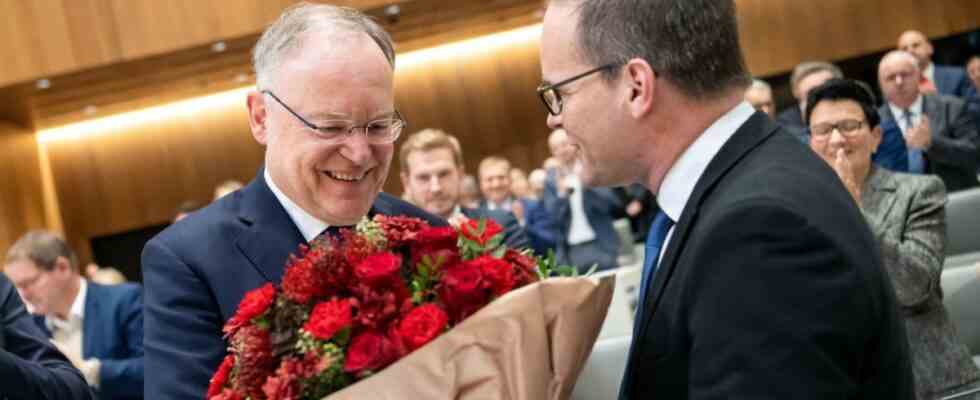Four weeks after the election, the state parliament in Hanover re-elected Prime Minister Stephan Weil (SPD) as head of government at its constituent session and at the same time confirmed the new red-green state government. Red-Green has 81 votes in the state parliament, seven more than is required for an absolute majority. Weil got 82 votes when he was elected. If all MPs from the SPD and the Greens voted for him, at least one vote must have come from the opposition. The CDU parliamentary group seemed visibly dismayed after the result was announced. Apparently, the deviants were suspected to be in their own ranks.
Because even before the vote, he was relaxed. After only five days of negotiations, the SPD and the Greens agreed on a coalition that was approved by both sides with huge majorities at special party conferences over the weekend. There was much praise for the coalition agreement from both the SPD and the Greens. So Weil didn’t have to be afraid of dissenting voices from his own camp. “There’s a lot of work ahead of us. And because I like working, I’m happy,” he said when he arrived in the state parliament.
The ports of the country – “the gateway to the energy world”
In his government statement, energy policy played a central role as an important part of climate protection. “We want to establish Lower Saxony as the No. 1 energy state and thus once again significantly strengthen it as a business location,” he said. Lower Saxony is already the number one wind power state, the state’s ports are “the gateway to the energy world”https://www.sueddeutsche.de/politik/.”We are the energy storage facility for all of Germany and a leader in energy research.
At the same time, Lower Saxony is establishing itself as the “heartland of the hydrogen economy” and as the “center of the offshore industry”. In Wilhelmshaven and Stade, liquid gas terminals were built within a very short time, thus making a contribution “to the security of supply throughout Germany”. In the future, more and more climate-neutral hydrogen should arrive there for the energy supply. All of this is “a great opportunity for climate protection and a historic opportunity for our country,” said Weil. In this way, progress can be made out of the crisis. “Nuclear power and fracking are not the answer,” Weil said.
According to the will of red-green, Lower Saxony should become climate-neutral by 2040, five years earlier than previously planned. To do this, “a massive expansion of renewable energies is essential,” said Weil. The state wants to provide financial support for the transformation process and the necessary investments in other areas, such as building renovation, under the umbrella of its own “Lower Saxony Fund”. This will “of course happen in compliance with the regulations on the debt brake”.
Lower Saxony’s new cabinet with the prime minister and lucky chimney sweep on Tuesday before the state parliament in Hanover.
(Photo: Sina Schuldt/dpa)
Naturally, the current energy crisis as a result of the Russian invasion of Ukraine also took up a lot of space in his speech. Before the end of this month, the red-green government wants to decide on its own immediate program of around one billion euros via a supplementary budget, with which cases of hardship among citizens and companies are to be cushioned. Weil had already announced such a program during the election campaign, but the previous coalition partner, the CDU, was not prepared to decide on a supplementary budget before the election.
The AfD senior president avoids a scandal at the start
The opening session of the state parliament began with a piquant personal touch, which the Bundestag had similarly prevented with a tricky change in the regulations. Jozef Rakicky, born in 1956 in the former Czechoslovakia, was the senior president who opened the meeting, of all people. The physician, who most recently worked as chief physician at a clinic, is considered an opponent of vaccination and a lateral thinker.
Since the senior president is not only responsible for handling the first steps in the constitution, but also has the right to hold a kind of opening speech, the first scandal could have quickly arisen from this. But Rakicky did his job reluctantly and with an emphasis on politeness. Apparently, the other factions wanted to avoid immediately pushing the AfD into a martyrdom role if their deputy had been rejected.

